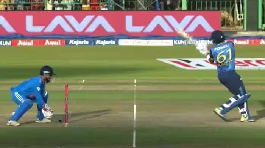In a high-stakes encounter at R. Premadasa Stadium, Colombo, the third and final ODI between India and Sri Lanka on August 7, 2024, will be remembered for a moment of chaos that left fans and players alike in disbelief. As Sri Lanka battled to set a competitive total, India’s wicketkeeper-batsman Rishabh Pant found himself at the center of a pivotal incident, one that could have altered the course of the match.
Pant’s Crucial Miss and the Third Umpire’s Blunder
It was the last ball of the 49th over when the drama unfolded. Maheesh Theekshana, Sri Lanka’s lower-order batter, had just failed to connect with a delivery from Kuldeep Yadav. The ball spun sharply, beating Theekshana’s bat and landing safely in Pant’s gloves. With Theekshana well out of his crease, it seemed a straightforward stumping opportunity—one that Pant, known for his agility behind the stumps, should have seized with ease.
However, in an unexpected twist, Pant hesitated. Theekshana, realizing his blunder, scrambled to regain his ground. The Indian wicketkeeper took what felt like an eternity to remove the bails, and when he finally did, the batter was already safely back in his crease. The Indian camp, expecting an easy wicket, was left stunned as the third umpire, Paul Reiffel, was called upon to make the final judgment.
Reiffel’s decision-making process only added to the tension. After an extended review, the giant screen at the stadium flashed the word “OUT,” sending the Indian fans into a frenzy. But the celebration was short-lived. Moments later, Reiffel corrected himself, ruling Theekshana “NOT OUT,” citing that the Sri Lankan batter had grounded his bat before lifting it in the air, a move still considered safe according to the rules. The confusion on the field was palpable, and the moment highlighted the pressure and unpredictability that come with high-profile matches.
Sri Lanka’s Fighting Total: Fernando Shines
Before the controversy, Sri Lanka had laid a solid foundation for their innings. Winning the toss and opting to bat first, Captain Charith Asalanka’s decision paid dividends early on. Openers Avishka Fernando and Pathum Nissanka displayed remarkable composure, putting together an 89-run partnership that frustrated the Indian bowlers.
Nissanka’s dismissal for 45 by Axar Patel brought some relief to India, but Fernando continued to anchor the innings with a classy knock. The right-hander was in sublime form, mixing aggression with caution, as he edged closer to what would have been a well-deserved century. Unfortunately for Fernando, he fell agonizingly short of the milestone, dismissed for 96 off 102 balls by debutant Riyan Parag, who celebrated his first ODI wicket with gusto.
Fernando’s departure did little to derail Sri Lanka’s innings, as Kusal Mendis stepped up with a crucial 59 off 82 balls, guiding his team to a respectable total of 248/7 in their allotted 50 overs. Parag, despite being new to the international scene, impressed with his figures of 3/54, offering a glimpse of his potential as a future star for India.
The Impact of Pant’s Miss on the Match
Pant’s missed stumping and the ensuing umpiring error have sparked debates among cricket aficionados. While India’s bowlers managed to restrict Sri Lanka to a chaseable total, the missed opportunity could have significantly eased the pressure on the Indian team. Pant, who has often been lauded for his quick reflexes and match-winning performances, will likely view this moment as a learning experience, a reminder of the fine margins that can define a cricket match.
In the grand scheme of the series, this incident serves as a stark reminder of the unpredictability of cricket—a sport where even the smallest lapse in concentration can lead to dramatic consequences. As the Indian team prepares for the next challenge, they will undoubtedly reflect on the lessons from this game, with Pant’s missed stumping etched in their minds as a moment that could have been.



